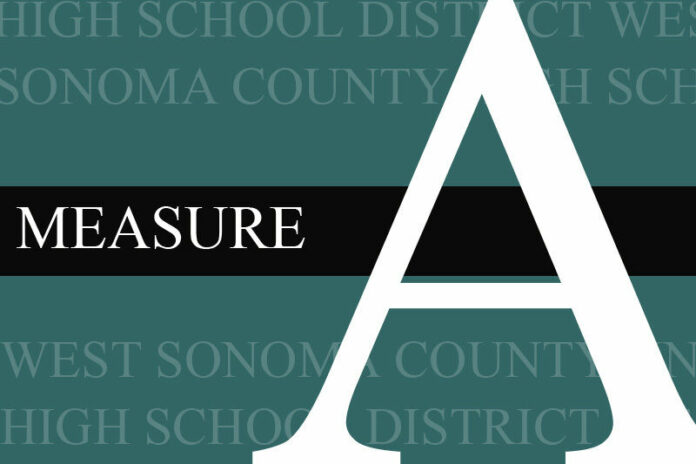West county voters will drive the destiny of a West Sonoma County Union High School District parcel tax in the fast-approaching March 2 special election.
Measure A, proposing a $48 annual parcel tax for three years, is expected to capture $1.15 million a year that will stay local if two-thirds of the voters approve the levy, according to the county ballot measure information.
The measure’s introduction text reads that the tax would “protect music, art, dance, shop, culinary and other career technical programs; retain teachers/staff; keep class sizes low,” at Analy, El Molino and Laguna high schools and none of the revenue would go to administrator salaries.
According to the provided county counsel’s impartial analysis, an approved parcel tax would take its place beside an existing $79 annual parcel tax on July 1, 2021.
Sonoma West Times & News reported in November 2020 how the parcel tax measure overcame initial dismissal from the WSCUHSD board of trustees to become the key to staving off a consolidation decision by about a year if passed.
Faced with declining enrollment and a worsening structural deficit, WSCUHSD trustees and administrators are considering a merger of school sites to cut costs and ultimately prevent insolvency.
The parcel tax measure shares the ballot with the more contentious Measure B, to establish another west county transient occupancy tax anticipated to also draw money to the high school district.
Opponent says parcel tax keeps “kind of a sinking ship afloat”
Daniel Drummond, executive director of the Sonoma County Taxpayers Association, penned the counterargument against the parcel tax in the Measure A ballot information. Drummond said he lives in west county, near Valley Ford, while the Sonoma County Taxpayers Association has members across the county.
“Something has to give,” he wrote, positioning that the district doesn’t need all its facilities because of declining student enrollment. “It’s time to trim surplus facilities from the balance sheet and cut expenses,” his rebuttal said.
Drummond was careful not to outright endorse consolidating the west county high schools in a Feb. 23 phone interview, though, saying he wasn’t on the board of trustees.
“I don’t want to go out and say they need to consolidate because I don’t know that that’s the answer. They clearly need to cut costs. Now, they may have some other options available to them that I’m not aware of, but it would appear that consolidation is probably the route they’re probably going to need to go,” he said.
“The West Sonoma County Union High School District, they have a real serious problem, there’s no doubt about it,” he said. “We don’t need to dismiss that.”
However, Drummond said the dwindling enrollment pulling the funds down with it has been an issue for at least a decade, before recent fires, floods and the COVID-19 pandemic.
Drummond said he did not view another tax as a solution because voters renewed a different parcel tax in 2020 and a $91 million bond measure in 2018, the latter earning his written opposing argument.
“They’re looking at additional tax revenue from the voters of the district in order to keep this kind of sinking ship afloat,” he said. According to Drummond, WSCUHSD is 10 years behind on a strategic response to the question of consolidation. “And what is it that you’re going to do now that requires another couple of years to make these decisions?”
When asked about Measure A’s goal to maintain teachers on staff, Drummond said school board trustees occasionally need to make difficult choices. “It very well may mean laying off people. It very well may mean closing down facilities,” he said, adding again that he wasn’t saying he supported those results because he’s not on the board.
“If your revenues keep going down but your expenses aren’t going down with them, you’re going to have to find a way to cut some expenses. And it’s painful,” he said. “And it’s a decision for the west county voters. Do they want to increase their tax in order to maintain excess facilities and excess staff beyond what is necessary to serve the declining student enrollment that they have?”
Drummond said he was not aware of an organized opposition to Measure A, besides that other property owners also had concerns and were loosely allied, if at all.
Campaign chair calls parcel tax “temporary win-win” for long-term solution
Debbie Ramirez of Sebastopol chairs the Measure A campaign in favor of the district parcel tax, summarizing in a Feb. 10 interview its aims of preserving small class sizes, the arts and the sports and career education programs.
“We don’t want to lose a campus this August 2021,” she said. “And we want to provide time to transition to long-term solutions for students.”
Calling the parcel tax measure a Band-Aid solution is a misconception, according to Ramirez, saying WSCUHSD’s declining enrollment is real.
“And Measure A isn’t there to backfill for declining enrollment. What it is is to allow the school district to take the time to give the students continuity while work is being done to find a long-term solution, which may include consolidation. It may include unification,” she said.
Ramirez said the strategic planning that could happen sheltered under a parcel tax involves the results of a unification study on west county’s 11 school districts requested by the high school district. The Sonoma County Office of Education (SCOE) is hiring an outside expert to work with to conduct the study, according to Jamie Hansen, SCOE Director of Communications.
The campaign chair said the study will take about 18 months to complete and show whether other configurations could save on costs overall by sharing teachers and “streamlining” overlapping services and possibly administrative positions.
“So, Measure A is a bridge-funding measure,” Ramirez said. The parcel tax arose as a pathway around the district’s projection that the distressed budget meant either turning out the lights at one school or cutting programs, which she said was why the campaign focuses on preventing a closure in August 2021 as well as saving electives and career education.
While Ramirez described an approved parcel tax as “a temporary win-win,” with a pending unification study, she acknowledged it was just that — temporary.
“It’s not that this is to prevent that from ever happening in the future. And I think that’s where a misconception might be, that people think that it’s temporary. And the funding is temporary, but the solution is long-term,” she said.
Minimizing students’ trauma is a key motivator for passing the parcel tax, according to Ramirez, who said the time for a shift addressing falling enrollment was not “right now, during a pandemic on the heels of fires and floods and evacuations that these students have had to go through,” and six months out from August.
She said west county youth have been “accelerating” through traumas from environmental disasters to a year outside the classroom, disproportionately affected by internet access issues in distance-learning.
Additionally, Ramirez said some people did not know that Measure A would replace Measure K, a different $48 parcel tax passed in 2012 that expires at the end of the 2020-21 fiscal year. “So, this would essentially just fill in on our tax bills,” she said.
Furthermore, the campaign chair said she assured concerned community members through outreach text-banking that seniors and disabled people on fixed incomes can seek waivers for the district parcel tax. The county counsel’s impartial analysis of the measure adds that residents who own contiguous parcels will only be taxed “for one parcel provided the main parcel is the owner’s primary residence.”
Editor’s Note: This article was edited to reflect updated information on the district unification study. WSCUHSD had requested SCOE conduct the district unification study and since then, SCOE is hiring “an outside expert and will work with them to actually conduct the study,” according to Jamie Hansen, SCOE Director of Communications on Feb. 26.
This article was also edited to reflect the correct expiration date for Measure K as the end of the 2020-21 fiscal year, not the end of 2021 as a calendar year, according to WSCUHSD Superintendent Toni Beal on March 2. Measure A would replace Measure K if it passes, she said.









